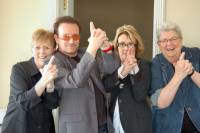Rock star Rod Stewart and
fiancée Penny Lancaster have had seven-month-old son Alastair baptised in an Edinburgh church, doubling the normal Sunday morning turnout!
The couple joined invited guests at South Leith Parish Church for the service, followed by a celebration lunch at the Balmoral Hotel.
Lancaster, 35, and Stewart, 61, live in Essex but chose the historic church because it is in the area where Rod's late father Bob was born. Stewart has six other children but Alastair is his first with Lancaster.
After the service, Stewart, dressed in a kilt, and Lancaster left the church to a round of applause from parishioners and well-wishers who had gathered outside in the sunshine. Baby Alastair, who was wrapped in a blanket, was put into their red Jaguar car before they left. The couple did not answer questions from waiting journalists.
Lancaster gave birth to the couple's first child at St John and St Elizabeth Hospital in London in November. They chose the name Alastair because of its Scottish origins and the middle name Wallace as a tribute to Lancaster's grandfather, who died in a road accident in 2003.
Stewart's other children include Kimberly and Sean by his first wife Alana Stewart. He had a daughter Ruby with his former girlfriend Kelly Emberg and two other children, Renee and Liam, from his marriage to Rachel Hunter. The singer also fathered a child when he was much younger but was not involved in raising the infant.
Arthur Mathieson, session clerk at the church, said after the ceremony that it had been a proud moment for the church and its congregation.
He said: "We were very proud and excited that they had chosen our church to have this. Rod just acted like any other proud parent at a christening and he spent time at the end shaking hands with everybody on their way out. I think Rod chose this because he wanted to go back to his roots, with his father being from Leith. I just think he was really impressed with this church in particular.
"It was especially good that he had the service with the public at the normal time of 11am on a Sunday. We were pleasantly surprised that they wanted to go with the regular public worship because everyone had assumed they would want to do it at a different time."
Among those who turned out for the service was Stewart's daughter from his first marriage, Kimberley Stewart, and his friend Gordon Strachan, the manager of Celtic, who gave shares in the club as a christening gift.
After the service, Stewart admitted that the event had brought him to tears. Although the church service was not altered in any way from a normal Sunday service, there was a real sense of occasion and feeling of excitement from members of the congregation.
As the service started, Rev Gilmour warne the congregation that they were not to take any photographs with cameras or mobile phones during the service. Towards the end of the ceremony, Ms Lancaster became the only person to break the rule when she started filming her child as family members waved at her camcorder. With great excitement, she turned the camera on the rest of the congregation, who were singing The Christian Greeting.
When invited up to the altar for the christening ceremony, Ms Lancaster smiled widely as her son was baptised, while Stewart struggled to hold back his tears. They then stood hand in hand as their son was baptised.
Rev Gilmour said: "Alistair will be brought up in California but Penny and Rod have made the commitment to bring him up within the Christian framework." (Editors comment - "whatever that might mean !)


